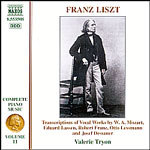
Liszt: Complete Piano Music - Vol. 11 (Transcriptions of Vocal Works by Mozart, Lassen, Franz, Lessmann and Dessauner)
 $25.00
Out of Stock
$25.00
Out of Stock6+ weeks add to cart
FRANZ LISZT
Liszt: Complete Piano Music - Vol. 11 (Transcriptions of Vocal Works by Mozart, Lassen, Franz, Lessmann and Dessauner)
Valerie Tryon (piano)
[ Naxos / CD ]
Release Date: Monday 11 October 2004
This item is currently out of stock. It may take 6 or more weeks to obtain from when you place your order as this is a specialist product.
"Valerie Tryon is an accomplished and sensitive guide in these wonderful song transcriptions"
- Gramophone
"Canadian Valerie Tryon plays more transcriptions of vocal music in Vol 11. A La Chapelle Sistine combines Allegri's Miserere and Mozart's Ave Verum Corpus in a 13-minute fantasy. Two movements from Mozart's Requiem, Confutatis Maledictis and Lacrymosa make an apt coupling. The songs by now totally unknown composers Lassen, Lessmann, Franz and Dessauer are performed very tastefully."
- Straits Times, March 31, 2000
"Valerie Tryon is an accomplished and sensitive guide in these wonderful song transcriptions"
- Gramophone
The art of transcription essentially began when the earliest composers took a theme by someone else and created an improvisation or a set of variations. It was not uncommon among Bach's works to find transcriptions of Vivaldi or other composers, re-cast in a different instrumental costume. So it cannot be said that Franz Liszt invented the concert paraphrase or transcription. But what can be said, is that Liszt, like no other composer before him (or after him), expanded, nurtured, perfected, and practised the art of transcription. His influence on succeeding generations of transcribers (Busoni, Godowsky, Rachmaninov, Grainger, to just name a few) was enormous.
During his lifetime, Liszt produced an astonishing quantity and variety of transcriptions. From Palestrina and Allegri to his nineteenth century musical contemporaries, all music was grist for Liszt's transcription mill. Most cataloguers of Liszt music divide the transcription output into two distinct groups - (a) the paraphrases and operatic transcriptions; and (b) the "partitions de piano". In the paraphrases and operatic transcriptions, Liszt allowed himself considerable freedom and fantasy, while the "partition de piano" were essentially instrumental transcriptions were an objective realisation of the original composer's intentions is provided on the piano. All of the works on this disc fall into the category of "partitions de piano".
Tracks:
Wolfgang Amadeus MOZART-LISZT: Confutatis maledictis and Lacrymosa from Requiem, K. 626, S550/R229
01. Confutatis maledictis and Lacrymosa 06:09
A la Chapelle Sixtine: Miserere d'Allegri et Ave verum Corpus de Mozart (2nd Version), S461/R114
02. A la Chapelle Sixtine: Miserere d'Allegri et Ave verum Corpus de Mozart (2nd Version) 12:59
Eduard LASSEN-LISZT: Two Lieder
03. Lose, Himmel, meine Seele 04:56
04. Ich weil in tiefer Einsamkeit 03:56
Robert FRANZ-LISZT: Er ist gekommen in Sturm und Regen, Op. 4, No. 7, S488/R162
05. Er ist gekommen in Sturm und Regen 02:52
Auf geheimen Waldespfaden, Op. 2, No. 1, S489/R163
06. Auf geheimen Waldespfaden 01:58
Druben geht die Sonnescheiden, Op. 2, No. 2, S489/R163
07. Druben geht die Sonnescheiden 02:50
Trube wirk's, Op. 2, No. 3, S489/R163
08. Trube wird's 01:10
Sonnenuntergang, Op. 2, No. 4, S489/R163
09. Sonnenuntergang 01:05
Auf dem Teich, Op. 2, No. 5, S489/R163
10. Auf dem Teich 02:07
Der Schalk, Op. 3, No. 1, S489/R163
11. Der Schalk 02:39
Meerestille, Op. 8, No. 2, S489/R163
12. Meerestille 02:41
Der Bote, Op. 8, No. 1, S489/R163
13. Der Bote 03:43
Treibt der Sommer seinen Rosen, Op. 8, No. 5, S489/R163
14. Treibt der Sommer seinen Rosen 01:19
Gewitternacht, Op. 8, No. 6, S489/R163
15. Gewitternacht 04:01
Das ist ein Brausen und Heulen, Op. 8, No. 4, S489/R163
16. Das ist ein Brausen und Heulen 01:04
Fruhling und Liebe, Op. 3, No. 3, S489/R163
17. Fruhling und Liebe 01:47
Otto LESSMANN-LISZT: Drei Lieder aus Julius Wolff's Tannhauser, S498/R177
18. Der Lenz ist gekommen 03:39
19. Trinklied 01:46
20. Du schaust mich an 02:38
Josef DESSAUER-LISZT: Drei Lieder, S485/R150
21. Lockung 03:33
22. Zwei Wege 02:04
23. Spanisches Lied 04:12

